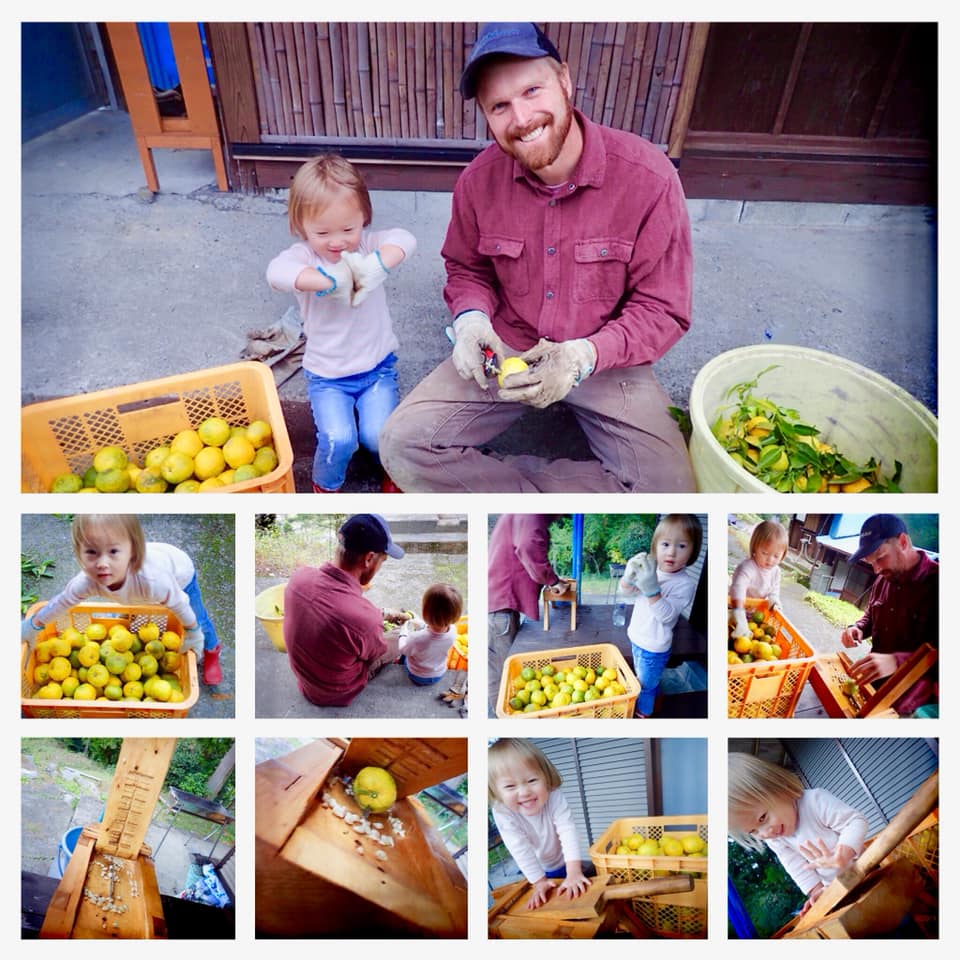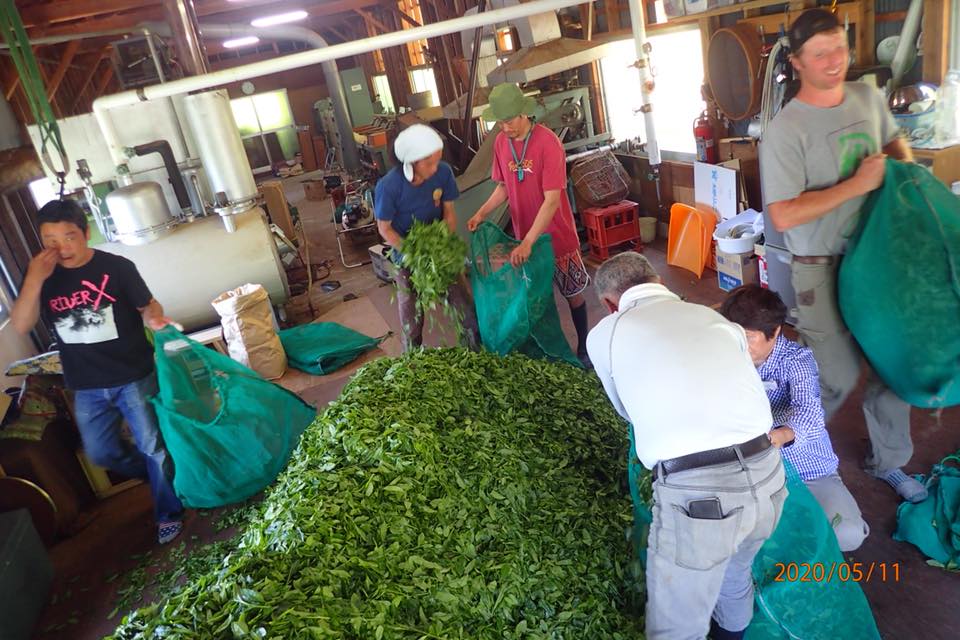今回は、高知県大豊村在住のアメリカ人茶農家、ヤンシー・レバーさんへのインタビューをご紹介します。ヤンシーさんは日本茶の世界では比較的新しい方で、3シーズンの茶摘みを経験したばかりですが、この短い期間で、大豊村や自身の茶園がある徳島県有瀬村の復興に貢献してきました。現在、日本の拠点で、パートナーの梓さんと奥様、そして増え続けるご家族と共に、刺激的なプロジェクトを計画しています。ヤンシーさんが茶農家になるまでのストーリーを語る、このインタビューをぜひお楽しみください!

Moé:まずは今日はインタビューを受けてくださり、ありがとうございます。イアンさん(イアン・チュン)が1年ほど前にインスタグラムでインタビューされているので、質問内容が重複する部分もあるかもしれませんが、茶農家の方(つまり外国人)からのインタビューをブログという形で発信し、文章で皆さんに知っていただけたらいいなと思いまして。ところで、イアンさんはアメリカ出身ですよね?
ヤンシー:はい、シアトルの対岸にあるワシントン州で育ちました。日本に来る前はコロラド州に4年ほど住んでいました。
Moé:では、早速質問させていただきます。日本で茶農家になったきっかけについてお聞きしたいのですが。
ヤンシー: 2015年にバックパッカーとして旅に出ました。メキシコに行ったんですが、特に計画も立てていなかったんです。ところが、世界各地から来た3人の女の子と旅することになり、そのうちの一人が日本人の女の子だったんです。それで、最終的にエクアドルまで7ヶ月間一緒に旅することになりました。そこで私たちは恋に落ちたんです。全財産を旅に使ってしまったので、最初はアメリカに戻りました。3ヶ月ほど働いてから日本に引っ越しました。それまで日本は特に考えたこともなかったんです。とにかく、低予算で、しかも安く旅行したいと思っていたんです。日本について何も知らなかったんですが、当時の彼女が山の中にゲストハウスがあって、ラフティングもできるって話を聞いて、日本に来て、お茶農家のところで茶の摘み取りや草刈りの仕事をすることになりました。他にちゃんとした仕事はなくて、ただパートタイムで働いていたんです…えっと、日本語は話せますか?
萌:はい…でも、今はコロナ禍だし、フランスにいて近くに日本人の繋がりがあまりないので、ちょっと錆びついてしまっていますね。でも、やっぱり私は日本人ですからね。
ヤンシー:時々、分からないんです。英語しか話せないから。
Moé:ああ、もしそれが役に立つなら、言語を混ぜてもいいですよ。私はいつもコードを混ぜて使っています。
ヤンシー:よかった。アルバイトって言おうと思ってたんだ。とにかく、お茶農家のところで働いてただけなんだ。それに、僕の住んでいるところには若い人はあまりいない(※大豊町は若い人が少ないので、若い男性は65歳くらい)。だから、農家の人が手伝いに来てくれる人を探していた時に頼られる存在になったんだ。それで、その人が3年くらい放置されていた別の農家に連れて行って、こう言ったんだ。
「そうだね、仕事が必要だね!だから、もし君が望むなら、この茶葉を伐採してもいい。そうすればまた生えてくる。そして、この土地で農業を始められるよ」
当時、敷地内の家には女性が住んでいたのですが、今はもう住んでいないので空き家になっています。とにかく、他に特に重要な用事もなかったので、お茶の収穫をかなり短くしました。すると翌年にかけてまた茶葉が戻ってきました。つまり、翌年に収穫できたということです。
萌:悪くないね!
ヤンシー:それで、その茶園を引き継いで、それから別の茶園も引き継ぎました。そこは、もう経営をやめるという決断をするまで経営されていた人たちが経営していた茶園です。ですから、2つ目の茶園はずっと良い状態でした。去年は収穫量が多かったんです。
萌え:耕作放棄地の茶畑を譲り受けているんですね。高知県大戸屋村にお住まいですか?
ヤンシー:いや、オトヨ。
萌え:すみません、大豊さん。その地域についてはよく知らないんです。
ヤンシー: 四国(日本の5つの主要な島のうちの1つ)に行ったことがありますか?
萌え:ええ、まあ、短い旅行だけですよ。愛媛県にはしまなみ海道サイクリングロードを走るために行ったことがあります。あとは徳島県の芳市という田舎の村で、 農村演劇のイベントを手伝うために1週間ほど滞在したこともあります。
ヤンシー:あら!私の農場は高知県と徳島県の境目にあるんですね。実は徳島県にあるんです。
萌え:なるほど。ところで、このやりとりはすべて日本語で行われているんですか?
ヤンシー:ええ、ほぼそうです。日本語はあまり上手じゃないんです。でも、だいぶ上達しました。覚えました。それで、お茶の栽培を始めました。みんながやっているのをほとんど見ながら。そして、同じことを繰り返しています。年に2回茶葉を刈り込み、収穫は1回だけです。
もえ:一番茶だけ収穫ですか?
ヤンシー:はい。
Moé:高知に移住する前から日本茶に興味があったんですか?それとも、偶然に惹かれたんですか?
ヤンシー:これは偶然の産物です。日本に来る前は、緑茶を飲んだことさえなかったかもしれません(笑)。お茶に何か特別な情熱を持って移住したわけではありません。全く。ただ仕事が好きだったんです。仕事をしている人たちが好きだったんです。何かやりたいことがあって、面白かったんです。妻と一緒にこの小さなお茶のビジネスを築けたことは、楽しくてやりがいのあることでした。
Moé:とても素敵ですね。Yunomiのサイトをご利用いただいたのは比較的最近だと伺いました。お茶農家としてどれくらいの期間を活動されているのですか?
ヤンシー:約4年間で3回のお茶摘みをしました。Yunomiでお茶を販売し始めたのは今年が初めてか、もしかしたら2年目かもしれません。
Moé:これまで、海外の茶農家さんへのインタビューはなかったのですが、何かご苦労された点などがあれば教えていただけますか?
ヤンシー:外国人だからとか?
Moé:外国人だから、そうかもしれませんね。でも、新しい茶農家が直面するかもしれないさらなる課題についても、ぜひお聞かせください。
ヤンシー:私にとって、茶業で難しいのはお金を稼ぐことです(笑)。ほとんどの小規模茶農家は自社工場で茶葉を加工しています。農園の近くに工場を持っているか、自社で工場を持っているのです。でも、私は茶工場の設備を全て持っているわけではありませんし、茶工場も所有していません。そのため、多くの小規模茶農家の茶葉を加工している大規模な茶工場に料金を支払っています。茶葉全体の価値の約3分の1を工場に支払うことになります。そして、残りの3分の1は肥料、アルバイトの人件費、そして包装費に充てられます。私はジップシールと厚めのパッケージを使った、ちょっと立派な包装をしています。お金が全部事業につぎ込まれると、あまり儲からなくなります。それに、日本でお茶を売るのも実は難しいんです。
 Yanchaの素敵なお茶のパッケージをチェックしてください!
Yanchaの素敵なお茶のパッケージをチェックしてください!
萌:想像するに…
ヤンシー:高知のファーマーズマーケットでお茶を売っています。たくさん売れる時もありますが、大変です。それに時間もかかります。全部終わっても時給500円(約4.40ドル)以下でしょう。でも、もしそうじゃなかったら、誰も茶畑を手放さないでしょうね(笑)。京都とか、もっと大きな茶畑を持っているなら、もっと楽だと思います。私の茶農家よりもずっと良いシステム、もっと収益性の高いシステムを持っている農家もいます。それに、人手を見つけるのも大変です。若い人はあまりいません。年配の人たちは自分のやりたいことで忙しくて、自分の農園を持っているんです。だから、私の農園に来て茶葉の剪定をすることにはあまり興味がないんです。でも、手伝ってほしいと頼めば来てくれるんです。
 ヤンシーさんは2020年10月24日(日)に高知県の農産物直売所(日曜市)でお茶を販売しています。
ヤンシーさんは2020年10月24日(日)に高知県の農産物直売所(日曜市)でお茶を販売しています。
Moé:つまり、これらは日本の田舎に住むことで起こる課題ということでしょうか?
ヤンシー:ええ。でも、外国人であることの良い点は、お茶を売るのが楽なことかもしれませんね。だって、人々の注目を集めるんですから。白人で何かを売っているのは私だけなんです。野菜を売っている外国人は他に一人いるんですが、日曜市はとても大きくて、通り過ぎる人たちが私を見上げて「えっ?」って言うんです。
「え!?白人がお茶を売ってるの??」と聞かれたら、
「このお茶は栽培しているんですか?」
そして私は彼らに「はい、私は茶農家です」と言います。
「えっ!?!?!?お茶農家!?」という驚きの反応です。
そうすれば、お茶を売りやすくなります。
Moé:景色が目に浮かぶようです(笑)…でも、きっと彼らはあなたを応援したいだけか、あなたのお茶を試してみたいだけなのでしょう!

Zoomワールドスナップショット - コロナ禍で移動が困難になっている一方で、このような形で茶農家の方々にインタビューできることに感謝しています。このインタビューがきっかけで、ヤンシーの茶村と将来ゲストハウスを訪ねることにしました。近い将来、実際に訪問できることを願っています!
萌え [続き]:四国地方には伝統的な民間茶があることは知っています。 碁石茶みたいなものもそうですが、残念ながらまだ飲んだことがないんです。
ヤンシー:実は、碁石茶は私が住んでいるところ、大豊村産なんです。碁石茶の主要農園は、実は私の家のすぐ近くなんです…
萌え:おお、それはすごく素敵ですね!でも、煎茶やほうじ茶みたいな普通の日本茶を作るんですか?碁石茶は作らないんですか?
ヤンシー:発酵茶は作ったことがないので、煎茶をやっています。茎も全部入っている煎茶です。それから、細茎を取り除いた特選煎茶(やぶきたという高級品種)も作ります。茎茶のティーバッグが手に入ったら、それを使ってほうじ茶を作ります。また、以前働いていた農家さんから番茶を買って、ほうじ茶を作って利益も得ていました。私のほうじ茶はなかなか良い評価をいただいています。
もえ:では、Yunomiのお客様におすすめしたいお茶はほうじ茶でしょうか?
ヤンシー:よく分からないですね…でも私のほうじ茶は独特なんです。というのも、私は「バイセンキ」(焙煎機)で焙煎しているんです。自分で作った炭で焙煎するんです。炭は自分で作って、回転式焙煎機、確かバイセンキっていう機械を使っています。それを手で回して、すべて感覚でやっています。両端に穴が2つあって、煙が少し出始めたら2~3分待ってから取り出します。それからまた焙煎します。だから、じっくり焙煎したほうじ茶みたいな感じなんです。 イアンに送ったのは浅煎りだったと思います。だから私のほうじ茶はいつもとても良い評価をいただいていて、私が手作りしているから独特な味で美味しいんです。味も少しずつ変わっていくと思います。茎から焙煎することもあれば、番茶から焙煎することもあります。そして、今年の煎茶が売れ残っていたら、今年の煎茶をほうじ茶にしようと思っています。
Moé:手作業で焙煎する場合、焙煎にはどのくらい時間がかかりますか?
ヤンシー:一度に500gくらい作れます。時間を計ると大体13分くらいです。500g作って容器に移します。そしてまた500g入れます。これはいつも雨の日にやります。仕事ができない時、農場で何もできない時、あるいは雨で仕事がキャンセルになることが多い時です。だから大体梅雨の時です。「よし、今日は一日ある。家でゆっくりできる」と自分に言い聞かせます。だから今日は炭火でローストチキンをひっくり返して音楽を聴きながらほうじ茶を作ろうと思います(笑)。たいていは1日かけてほうじ茶を作ります。全部で5~6時間かかり、通常は4~6kgしか作りません。そんなに多くはありません。そして、ほうじ茶はすぐに売れてしまうので、また作らなければなりません。
やんちゃの未来 - お茶を中心としたゲストハウス
Moé:お茶で収益を上げるという課題についてお話されましたが、今後もお茶農家として続けていくお考えはありますか?
ヤンシー:ええ、お茶を育て続け、茶園も経営していきます。以前、今住んでいる家でゲストハウスを経営していたと話しましたが、2年ほど前に閉めました。娘が2人いるため、この2年間はお客さんが入っていなかったと思います。今は畳の部屋にいます(ヤンシーが周りの空間を見せてくれました)。ここは以前はゲストハウスの側でした。 「古民家」というとても古い家です。私が購入した当時は草葺き屋根でした。夫婦や独身者など、2人でゲストハウスを経営するにはとても良い環境でした。でも、娘が2人いると忙しくなりすぎてしまいました。私は仕事をしていて、保育園に子供たちを迎えに行くと夕食の時間になり、騒音がひどくなってしまうんです。騒音なので、ゲストハウスを経営していません。でも最近、すぐ近くに新しい家を見つけたんです。それでゲストハウスを再開する予定で、お茶と相性の良い小さなビジネスもいくつか計画しています。大豊でサイクリングツアーをやりたいんです。
萌:あ、自転車ツアーとお茶!絶対行きたくなるわ…
ヤンシー:ええ、交通量が少なく、景色の美しい山道がたくさんあります。それから、自転車ツーリング事業を立ち上げ、その後このゲストハウスを再開する予定です。他のお客様が来てくれると、お茶の販売がずっと楽になります。ゲストハウスを経営していた頃は、いつも囲炉裏に座ってお客様とおしゃべりしながらお茶を飲んでいました。そして、ほぼいつもお茶のティーバッグを数個は売っていました。だから、もう少し頑張ってみようと思っています。
Moé:それはとてもエキサイティングな計画ですね。もし5年後、10年後の自分のビジョンを描いているとしたら、ゲストハウスを中心に据えつつ、茶園経営を軸にしていく感じでしょうか?
ヤンシー:ゲストハウス、自転車ツーリング、そしてお茶の栽培と販売です。できる時は自分の仕事をするのが好きなんです。日本に住んで最初の3~4年は、雑用や草刈りなど、村の人たちを助けながら、自分の仕事をするのが好きでした。そして、1年ちょっと前に建設会社で働き始めました。でも、実は別の計画があって。だから、5年後の計画には建設会社で働くことは含まれていません(笑)。
やんちゃのそば・ゆず・シュミ
 満開のそばの花
満開のそばの花
萌え:将来のビジョンから、今の日々の活動に移りましょうか。お茶畑ではお茶とは関係のない商品も作られているんですね。例えば、そばや柚子とか?
ヤンシー:そうなんです!うちではそばを育てているんです。夏に植えるのにぴったりのカバークロップみたいなものなんです。ソバはどんどん育って、きれいな花を咲かせます。秋に種を収穫します。ソバを全部刈り取って、吊るして乾燥させます。12月末頃には、茎についた種を全部振り落とし、そば粉を挽いて、年越しそばを作ります!(※大晦日に長寿と健康を祈願して食べるそば)。
もえ:すごいですね。お蕎麦は自分で打つんですか?
ヤンシー:ええ、実はうち、麺を作るのがかなり下手なんです…そば粉は自分で作って、パンケーキとかに使うんですけど、麺を作るのは本当に下手なんです(笑)。それから、家に柚子の木が6~7本付いてきたんです。10本くらい植えたんですけど、そのうち8本か6本は枯れちゃったと思います… 肥料を入れすぎたから。
 2020年11月2日、娘の一人と一緒に柚子の収穫と作業を行う。
2020年11月2日、娘の一人と一緒に柚子の収穫と作業を行う。
萌え:あら、でも四国って柑橘類の産地としてすごくいいですよね。例えば愛媛県はミカンで有名ですよね。
ヤンシー:はい、ミカンや柑橘類の種類は豊富です。
Moé:ということは、これらはすべてお茶に関するサイドプロジェクトだと言えますか?
ヤンシー:それらは単なる「趣味」です。
萌え: [笑い] なるほど。そうですね、日々の生活の中にちょっとした喜びを持ち続けるのは良いことですね。
ヤンシー:鶏も飼っています。最近卵を産み始めたんです。去年の2月に迎えたと思います。「この鶏を食べよう」と思っていたんです。ところが4日後に家に帰ったら、卵が4個くらいと鶏の糞が出てきていました(笑)。ブルーベリーも育てています。3年ほど前から植え始めたブルーベリーの苗を7本植えて、さらにこのすぐ外に8本植えて、1ヶ月ほど後に植える予定です。これもゲストハウスと連携できるかもしれません。ミカン狩り、リンゴ狩り、カボチャ狩りなどにお金を出してもらえるので、将来的にはちょっとした企画として実現できるかもしれません。例えば、朝に外に出てブルーベリー狩りをしてもらえるようにするかもしれません。でも、実際には単なる趣味です。お茶以外の農業活動はすべて趣味です。お茶でお金を稼ぎたいんです。他のことはすべて趣味です。
気候変動とアルセ(茶村)
Moé: Yunomiを通して茶農家さんへのインタビューでは、気候変動が茶業に与える影響について伺ってきました。先生は茶業に携わってまだそれほど長くはないとは存じておりますが、日々の業務の中で気候変動の影響を感じられたり、茶農家として意識されていることはありますか?
ヤンシー:実はそれについては何も知りません。まだ十分に長くやっていないので。それに、誰も私にそのことを話したことがないと思います。他の茶農家の人たちもね。私の茶園があるところは茶村なんです。ほとんどの農家が、大小さまざまな茶園を所有しているんです。でも、気候変動については誰も私に何も話してくれなかったんです。2年前の春に問題はありました。5月の新茶が出たところで。一番茶の栽培が始まったんです。すると一晩「霜」が降りて、「霜やけた」んです。霜で茶畑が焼けてしまったんです。私の茶園は村の低いところにあるので、かなりラッキーでした。だから、実際にはそれほどひどいことにはならなかったんです。でも、他の多くの茶農家は通常の収穫量の半分くらいしか得られなかったんです。
萌え:それは、あなたの茶園がある徳島県有瀬町では霜が降りることはあまりないからですよね?霜が降りやすい茶園では、霜よけのファンが設置されているのを見かけますよね。今年は例年とは違う年だったのでしょうか?
ヤンシー:ええ、ちょっと変な感じでした。急に寒波が来たんです。ずっと暖かくて、暖かくて、暖かくて、それからお茶の木が「よし!いよいよ来るぞ!」って感じで、その後は順調に育っていたのに、また急激に寒波が来たんです。それが気候変動と関係があるのかどうかは分かりませんが、気候変動というのは気象パターンが不規則になるものですから。だから、もしかしたら…でも、こういうことは初めてではなかったようですが、かなり珍しいことですよね。
萌:なるほど…そうですね、多くの茶農家の方が、地球温暖化は茶栽培に深刻な影響を与えているわけではないと言っていますが、長期的に見れば、実感できる変化だけでなく、マクロレベルでの変化も起こっていると思います。ところで、あなたの茶園は茶村にあるとおっしゃっていましたが、共同体意識があるということですか?それとも、個人で作業されているのでしょうか?
ヤンシー:本当にコミュニティ意識が高いですね。みんながお互いの農園で手伝い合っています。茶摘みをしている時は、必ず一緒に昼食を食べます。この辺りでは日給が「一日一万円」(約88ドル)で、茶農家の人がいつも昼食をふるまってくれます(笑)。そして、一日の終わりには、たいていビールを2、3本持って帰ってくれます。だから、みんな一緒に食事をし、一緒に仕事をしているんです。ええ、ほとんどの人は60代から70代です。私が一緒に働いている夫婦は、二人とも85歳くらいで、一緒に茶摘みをしていますが、まだ元気にやっているんです。
萌:はい、日本の年配の茶農家の方々には驚かされることが多いですね。
ヤンシー:廃校があるんです。私が住んでいる村と茶畑は別々なんです。茶畑の村、アルセには、古い廃校があるんです。でも、そこをゲストハウスに改装したんですよ。これは一種のコミュニティプロジェクトみたいなもので、みんなで一緒にやっているんです。今はコロナウイルスの影響で閉鎖されていると思いますが。でも、とにかくコミュニティ意識がすごく高いんです。みんなで茶畑を手伝ったり、そば打ちをしたり、狩りをしたり…すごくいいコミュニティなんです。
 互いに助け合う茶農家。
互いに助け合う茶農家。
もえ:そういえば、豊一(徳島県)に泊まった時、すごくきれいなそば畑があって、泊まった宿のホストが、イノシシやシカなど、野生の肉しか食べられないって言ってくれたことがありました(笑)。… 似たような話ですね。どちらかというとサツマイモの里だったんですけどね。ところで、パートさんを雇うのは、収穫の忙しい時期だけなんですか?
ヤンシー:ええ。私の茶園では、収穫に丸一日かかります。かなり丸一日です。いつも6人くらい雇います。機械を操作できる人が少なくとも3人、そして茶袋を道路まで運んでくれる人が3~4人必要です。私の茶園は道路から少し離れているので、そのためにも人を雇う必要があります。それ以外では、年に2回だけ、他に1人必要になります。夏と秋の「刈り取り」(茶樹の刈り込み)の時だけです。3~4週間前に秋の刈り取りをしましたが、その時だけもう1人必要でした。
萌:それ以外の時間は、主にあなた一人で作業されているんですか?監視や追跡、茶園の作業全般ですか?
ヤンシー:ええ、主に私がやっています。草刈り、雑草や蔓の除去は全部私がやっています。今年は妻も手伝ってくれました。本当に助かりました!でも、彼女はまた妊娠したんです。だから、もう一人赤ちゃんが生まれるんです。
もえ:おめでとうございます!
ヤンシー:それで、私たちは3人の子供を産む予定なんです。一緒にお茶煎じができるなんて、すごく楽しかったんです。でも、彼女は赤ちゃんを産むから、しばらくはできないんです。
 ヤンシーさんの奥様でありパートナーでもあるあずささんが、お茶の栽培作業をお手伝いできた特別な機会のひとつ。
ヤンシーさんの奥様でありパートナーでもあるあずささんが、お茶の栽培作業をお手伝いできた特別な機会のひとつ。
ヤンシー・レバーからのメッセージ
もえ:楽しみにしていることがたくさんあるんですね!ところで、娘さんたちはもう家にいらっしゃるそうですね。それでは最後に、Yunomiのお客様、あるいはお茶を飲んでくださる方々に何か伝えたいことや、何か伝えたいことがあればお聞かせください。
ヤンシー:ええ、もしもう私のお茶を飲んでいるなら、試してみてくれてありがとう(笑)。えーっと、彼らに何を言えばいいんだろう…(間)
私のお茶を買ってくださる皆さんに、楽しんで、価値あるものだと感じてもらえたら嬉しいです。お茶を買ってくださる皆さんには本当に感謝しています。お茶を作るにはたくさんの手間がかかるからです。Yunomiでお茶を販売できるのは素晴らしいことだと思います。ぜひ私のお茶を楽しんでくださいね(笑)。それと、私のお茶のパッケージの裏には、私のインスタグラムのQRコードが付いていることが多いんです。 私のインスタグラム( yancha_boroya)をチェックしてみてください。日本の農業関連の情報を見るのも楽しいですよ。もしYunomiのお客さんで、日本の田舎で何が起こっているのか話したいという方がいたら、私はそんなに忙しくないんです…いや、忙しいんですけど、私のお茶を飲んでいる方や、四国や日本の田舎暮らしに興味がある方とお話できたら嬉しいです。
Moé:近いうちに、日本の田舎暮らしについてお話させていただけたら嬉しいです!今日はお時間をいただき、ありがとうございました。これからもお茶農家として、そしてパートナーやご家族と共に事業を成長させていく中で、ご多幸をお祈りしています。今日は貴重なお時間をいただき、お話を聞かせていただき、本当にありがとうございました。
Yanchaについての詳細:
- YunomiでYancy Leverのお茶をチェックしてください!
- ヤンシー・レバーとイアン・チュンのインスタグラムインタビューを振り返る
- ヤンチャのFacebookページ
- Yancy LeverをInstagramでフォロー
このブログ投稿のすべての写真は Yancha から提供されました。


